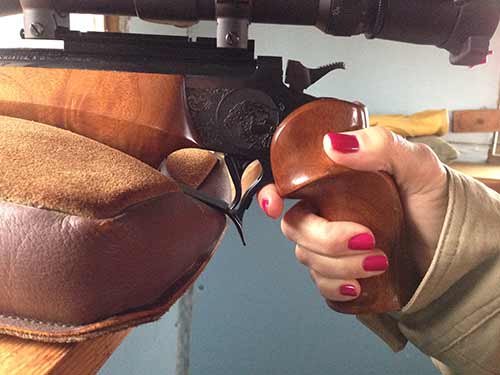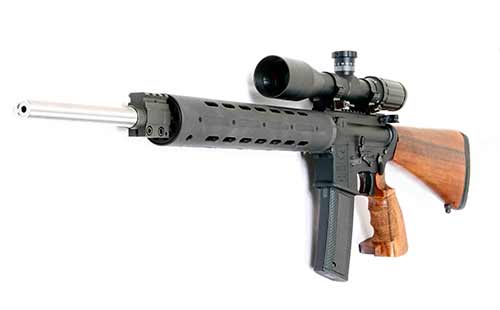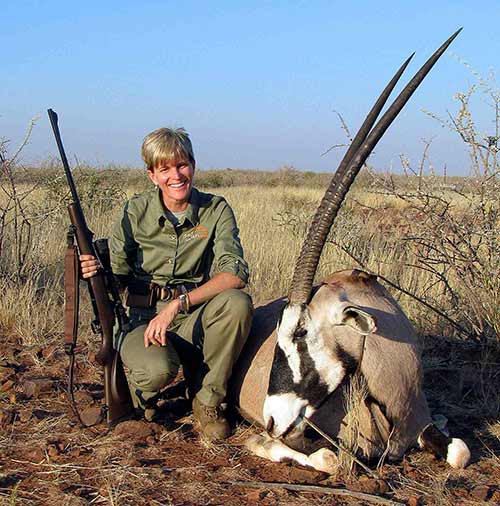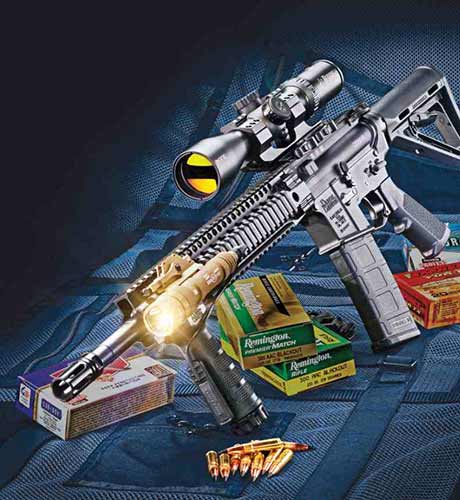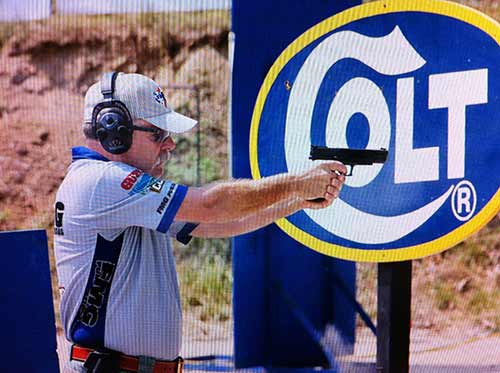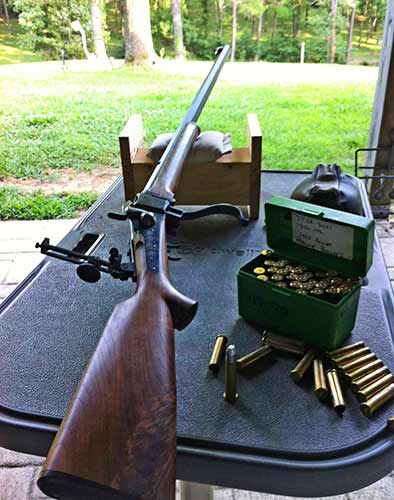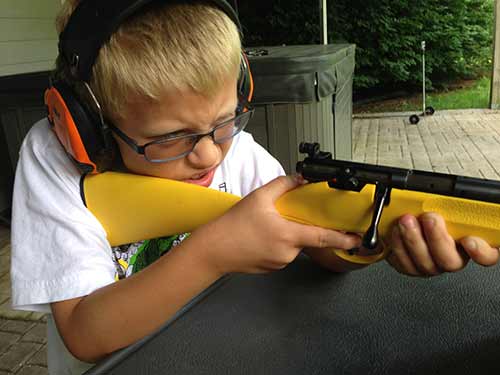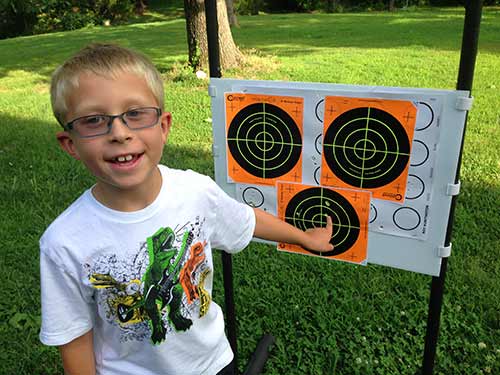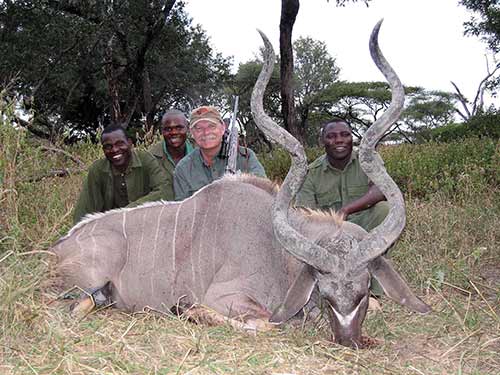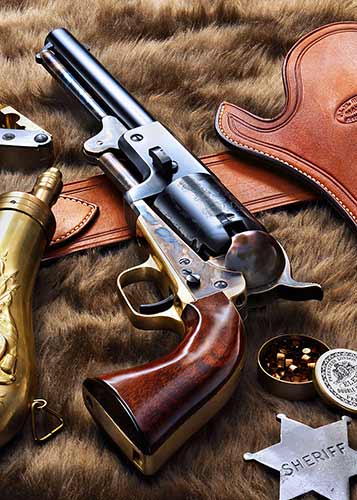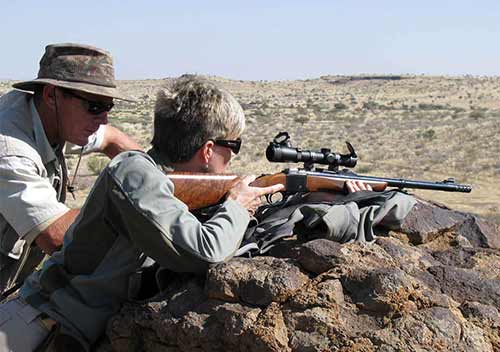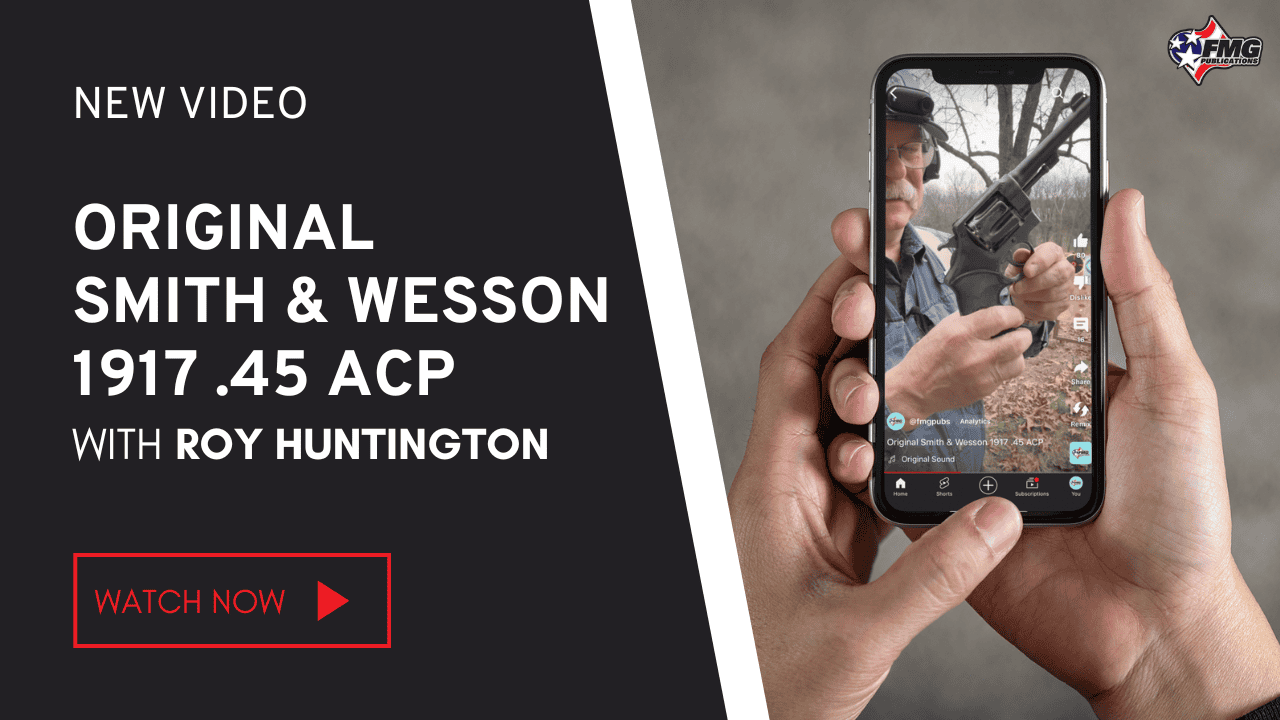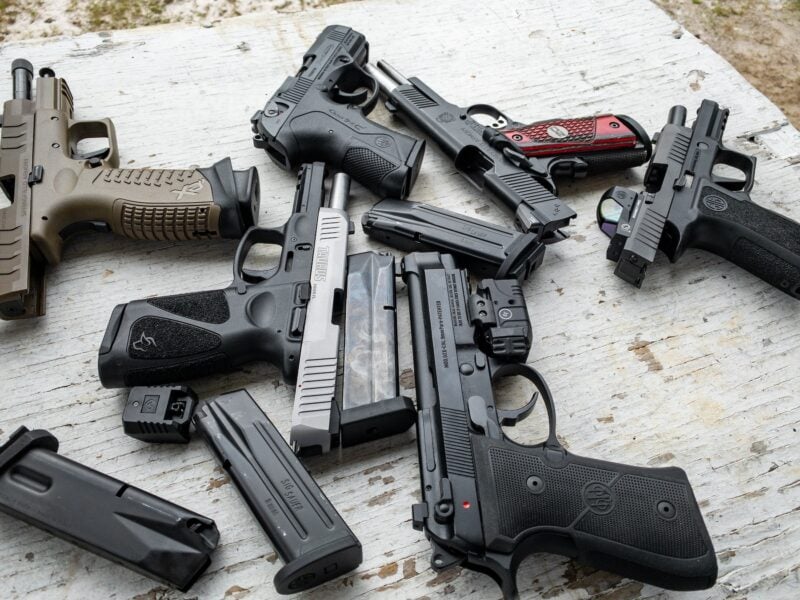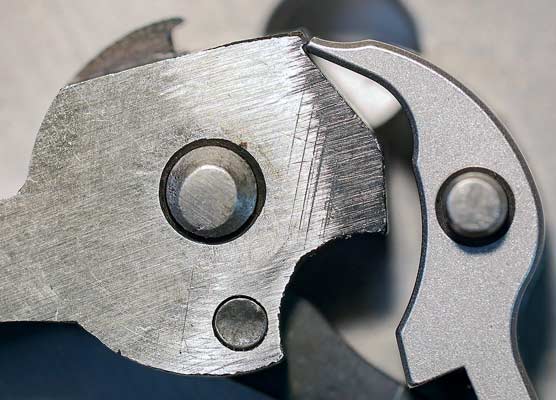Why Do We Shoot?
A Culture Of Marksmanship
More and more women are embracing shooting at every level. Here, Suzi Huntington takes aim at a Missouri deer while hunting from a blind. Pistol is a Thompson Center Contender.
I enjoy shooting. More specifically, I enjoy hitting the target, hearing the gratifying clang of steel or watching a reactive target do its work. Millions of other people do as well — but surprisingly few marksmen ever ask: why do we shoot?
This question first occurred to me while testing a new rifle at our Oregon ranch. Using a field position (I can freely admit: there wasn’t a bench at the intersection of the state and county road!), I had just hit a 12″ plate three times out of three at 880 yards. Right then, my father drove up, and apparently I still had the silly grin slapped on my face, prompting him to ask what I was smiling about. His own smile belied the practiced grumpiness in his voice.
With ill-disguised false modesty, I relayed my triumph in the blandest terms possible — something about proving my new 168-gr. handloads. With a noncommittal grunt, Dad cautioned me about wearing out the barrel and drove off, leaving me to ponder a dilemma.
The explosion of interest in the AR (Modern Sporting Rifle) has introduced tens of thousands of new shooters to the fun of precision rifle shooting.
The ability to shoot a rifle with precision can yield results like this. Suzi Huntington with a custom Model 70 Winchester in .30-06 in Nambia proudly posing next to her trophy Gemsbok.
Mixed Feelings
As I packed the Robar custom rifle in its case, I realized I had mixed feelings. Certainly I was happy with the gun, my handloads and my performance. But I couldn’t help but wonder why did I feel so good? It was something more than simply hitting a relatively small target at half a mile.
Part of the reason, obviously, was the immediate feedback: I knew instantly whether I’d been successful. But what was it about ringing the gong three times in a row to make it feel so rewarding?
Unable to answer this question, I began trying to dissect my marksman’s emotions. The deeper I delved into the subject, the more complicated it became. Clearly I needed help — a larger sampling.
So in 1997, I began taking an informal poll, asking dozens of marksmen from various disciplines — including archery — why they liked to shoot. What is it about hitting a mark with some type of projectile to make it so appealing? After the first few responses I realized some restrictions were necessary if the survey were to hold any relevance. I began narrowing the focus, eliminating generic responses such as “It’s fun” or “I can get away for awhile.”
At this point, I began getting nowhere incredibly fast. When shooters were asked to be more specific, the inevitable response was a prolonged silence, following an “I’ll have to get back to you.”
One important factor emerged early: concentration. As the legendary Rob Leatham says, “When I’m shooting I can’t think about anything else. I have to focus on what I’m doing, and that’s relaxing for me.” Any serious marksman agrees: mortgages, appointments, and politics simply vanish for the duration of the shot or series of shots. Therefore, shooting is relaxing.
“But,” exclaim the antigunners, “so is golf or tennis or tiddlywinks.” Which may be true, as shooting holds some of the attraction found in other accuracy games, but there’s a sensory difference: “Shooting is like golf, only much louder,” according to a Florida pistol competitor.
An Arizona marksman agrees, saying, “The stronger the stimulus, the stronger the response.” Another Arizonian flatly explains, “I like recoil.”
“Why we shoot” is often simply because “messing around” with guns is interesting. Learning the accessories and even how to build guns similar to this model from Daniel Defense, can be rewarding. Photo: Robbie Barrkman
Husbands and wives have found spending time honing marksmanship skills can make a nice change from the routine!
Many competitors say the focus needed to compete helps them to relax and forget the daily grind. Here, Roy Huntington, editor of Handgunner, takes a turn at the Colt side match at a recent Bianchi Cup.
Getting Philosophical
Addressing the inherent appeal of accuracy, an attorney places shooting in context, “A whole category of games are based on accuracy: taking this object here and placing it accurately there. Not just combat-based games like archery, but horseshoes, tiddlywinks, darts, bowling, pool/billiards and golf. We like those things because they’re hard to do, and there’s satisfaction in doing something difficult. Getting this ball from here into a little hole over there, 300 yards away, is hard, especially with — as Mark Twain said — ‘an instrument totally unsuited to the purpose.’
“Shooting has the appeal of an accuracy sport as well as a power sport. In addition to controlling power — like motorcycles, horses and airplanes — you get to exercise control of self, another of the essentials of our human-ness.”
Consider this from Seth Nadel, a retired Customs agent, competitor and instructor who compares shooting to other sports. “Why is shooting fun? Why is golf fun? (No really, I’d like to know that one.) Why is horseback riding fun, or skydiving, snorkeling, bike riding or any sport?
“Actually, shooting and riding horses are similar, in we learn to control a lot of power in either case. Politicians crave power over people. Most of us want to have control over some form of power, and guns offer the additional benefit of allowing us, in extremis, to control our environment. While satisfying our desire for control, we also can learn to use safety equipment to save lives.”
Others cited less tangible reasons, such as a California instructor who eloquently replied, “I enjoy the rich history of skill at arms, as well as appreciating the engineering genius behind the birth to these artifacts. My involvement in shooting makes me feel part of the continuum of history and gives me a greater appreciation of the works of historical figures.”
Old-school rifle shooting can be relaxing and a good way to experience some historical perspective on shooting. This is a Shilo Sharps rifle in .45-70.
Why shoot? For the owner of this Colt Navy, it was to protect themselves. This is one of a pair of Colts belonging to Wild Bill Hickock. It’s at the Cody Museum, in Cody, Wyoming.
For many shooting means time spent on ranges with friends.
Some Common Trends
Delving deeper, two key factors emerged from the poll: distance and control.
Shooting has to do with action at a distance: “You do something here, something happens over there,” says a civilian marksman.
A military professional agreed, “Man is a control freak. Not only does he want to be in control of himself, but also over everything he can manage … even at extended ranges.”
Control — especially self-control — is a recurring theme. A Marine Corps sergeant explained, “I think it has to do with man overcoming and controlling the forces or laws of nature. Taking it a step more, I’m sure some would say it all boils down to control.”
Almost as important as common trends, like control, were the omissions. Several respondents listed more than one factor, but nobody cited hunting as a major reason for why they enjoy shooting. While many shooters are hunters, not all hunters are recreational marksmen. Even though filling the stew pot is rewarding for many people, it has little to do with the specific attraction of shooting well.
The Spanish philosopher Jose Ortega y Gassett wrote in Meditations on Hunting, “One does not hunt in order to kill; one kills in order to have hunted.” Clearly, the same applies to our survey: thousands of accomplished shooters have never used a firearm to kill anything.
Similarly, the few references to power seemed to belie the old claim firearms represent a surrogate for sex. Presumably, the subject had been put to bed — so to speak — when psychoanalysis pioneer Sigmund Freud reputedly wrote in General Introduction to Psychoanalysis, “A fear of weapons is a sign of retarded sexual and emotional maturity.”
A word search of the 1920 text produces several weapons references but not the specific phrase. However, online citations indicate he might have made the statement in a previous lecture or a later edition.
In any case, apparently Dr. Freud — who almost certainly was not a shooter — understood what marksmen know empirically: shooting is a mental exercise. The payoff occurs above the neck, not below the belt.
The skill and discipline it takes to learn to safely handle a gun and to hit the target is almost universally enjoyed by kids. Taking the time to teach gun safety and how to properly handle a gun is time well invested for any adult. Here, Jack takes very careful aim during his first lessons with a Savage Rascal .22 rimfire.
A proud Jack shows off his first-ever target!
The challenge of hunting big game will always be a draw as to “why we shoot.” Here’s a nice Kudu in Zimbabwe.
Inside The Mind
The shooting scribe best known to the public is Pulitzer Prize winner and novelist Stephen Hunter, author of the immensely successful Bob Lee Swagger sniper series. A serious student of the game, he’s devoted considerable thought to the psychic aspects of marksmanship.
“To people who know nothing, we shoot for a sense of power, domination, destruction. We smell blood. We’re on some twisted macho death spiral, carrying ourselves and our civilization to oblivion,” he says.
“I wish it were that interesting! In fact, I shoot not for the inflation of ego, but for its deflation. Next to the gun, I am nothing and my real life, with its complexities, ironies, betrayals, regrets, failures and disappointments, goes away. The gun is a psychic steam bath to cleanse and refresh and reboot. I love the fact Steve Hunter vanishes and there’s only some narrow intellect guiding a somewhat shaky physical plant to achieve the classic strength, calm and perfection of the shot. I’ll never get there, but trying is almost a faith. It purifies you not in the accomplishment, but in the effort.”
Because challenges begin in the mind, a frequently cited reason for shooting is the personal test it presents. Jim Coxen, a Vietnam veteran and cofounder of Oregon IPSC, says, “Some people like to challenge themselves to do something well. With me, it was shooting.
“The challenge is always there to learn to do it better and not to let your performance slide. With me, at least, there’s also been an admiration for warriors and a very strong desire to be one. I fired expert the first time I qualified with a rifle in the Marines, and every time after. I would have been very disappointed in myself if I had lost my qualification.
“I believe when anyone does something well they usually enjoy doing it, which has led me to shooting for fun most of my life. Knowing what I am capable of with a gun also gives me a certain peace of mind.”
Beyond the immediate satisfaction of hitting a mark, frequently sport and survival overlap as motivations. Dwight Van Horn, a former LA deputy sheriff, explains, “Between 1973 and 1976 I shot for fun and to hone my handgun skills. In 1976, I was involved in an off-duty fatal shooting which really showed me how much more I needed to shoot to protect myself and the citizens I was sworn to protect. I started shooting competitively, which gave me lots of trigger time and elevated my skill level and confidence. I shot competitively until 1998, mindful the pistol matches were my continued honing of my skills.
“I retired in 1999 after 27 years as a LEO. I still shoot quite often. In addition to the handguns I’ve always shot I now shoot rifles and shotguns as well. I still shoot to keep my skills honed and to protect my wife and me; she shoots as well.
Shooting remains fun but nowadays my reason for wanting my skills to remain sharp is to protect my freedoms — paid for in blood since 1776. I certainly hope I don’t have to spill my blood to preserve my freedoms, but if I do, I will. My 40 years of shooting will pretty much also guarantee mine won’t be the only blood spilled that day.”
This Colt Dragoon (a replica) is filled with historical significance. History plays a powerful role in shooting for many. Photo: Jonathan Marmand
The ability to deliver a well-aimed shot at distance (“do something here which affects something way out there”) is compelling and drives many shooters to hone their skills.
Important Takeaways
So, how do we summarize this survey? Clearly, there are a variety of reasons for shooting, and many — perhaps most — are separate from the practical applications of self-preservation. Very few marksmen directly addressed the initial question: what is the attraction of striking a target, whether at 10 yards or 1,000?
To a large extent, the question answers itself. Shooting by definition involves conquering distance. (Remember: “You do something here; something happens over there.”)
However, nobody conquers distance with accuracy unless he conquers himself, which is why marksmen invariably are “control freaks.” They possess the motivation and the discipline to control their equipment, their bodies, and — most of all — their minds. Fully 40 percent of my respondents cited control of self or their environment as a primary reward for shooting.
Beyond self-defense and hunting, shooting icon Jeff Cooper deemed mastery of firearms “a good thing and it has served to overcome the customary feelings of inadequacy and insecurity encountered while growing up.” He noted after he began shooting at age eleven he had no further nightmares.
Cooper touched upon another little-noted aspect. Other than grass eaters and meat eaters, he believed the world was populated with “copers” and “non-copers.” He wrote, “the shooting master copes, and he is thus heavily armored against those anxieties that come from membership in the human race.”
In the years since my original inquiries, the nation has changed dramatically. Like most of you, I grew up with firearms as part of the environment. To me, they were as present as airplanes — though you’ll look hard to find the phrase “airplane culture.” I hadn’t heard the phrase “gun culture” until a reporter used it when Sandy Froman was elected NRA president in 2005.
Since then, “gun culture” has largely been a pejorative term in the mainstream media, and I realized I didn’t arise from a culture of guns. (Wes Hardin famously stated, “I am a gentleman of guns.”) But I come from a culture of marksmanship.
In the end, perhaps the answer as to why we shoot can only be found within ourselves. Each marksman has a personal reason for his pursuit, and each finds satisfaction and accomplishment within the parameters he (or she) sets for himself. In the end, this is enough.
So next time you take your favorite 1911 or rifle out to the range or (if you’re lucky enough!) the backyard, take a moment to reflect on why you enjoying shooting. And then keep on ringin’ steel.

